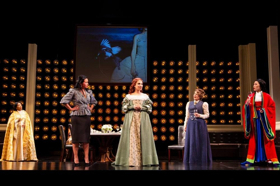Review: Liesl Tommy Returns to Huntington Theatre With Churchill's TOP GIRLS

Top Girls
Written by Caryl Churchill, Directed by Liesl Tommy; Scenic Design, Rachel Hauck; Costume Design, Linda Cho; Lighting Design, Mary Louise Geiger; Original Music & Sound Design, Broken Chord; Projection Design, Jeanette Oi-Suk Yew; Dramaturg, Phaedra Michelle Scott; Production Stage Manager, Emily F. McMullen; Stage Manager, Meg Tracy Leddy; Dialect and Vocal Coach, Chantal Jean-Pierre; Fight Consultant, Angie Jepson
CAST (in order of appearance): Carmen Zilles, Kiara Pichardo, Paula Plum, Vanessa Kai, Carmen M. Herlihy, Sophia Ramos, Elia Monte-Brown
Performances through May 20 at Huntington Theatre Company, 264 Huntington Avenue, Boston, MA; Box Office 617-266-0800 or www.huntingtontheatre.org
Tony Award-nominated director Liesl Tommy (A Raisin in the Sun, Ma Rainey's Black Bottom, Ruined) returns to the Huntington Theatre Company to lead a stellar, diverse cast in prolific British playwright Caryl Churchill's Top Girls. Written in 1982 as a diatribe against Prime Minister Margaret Thatcher's anti-union administration in England, the themes of Churchill's outspoken feminist play remain relevant and all too familiar more than three decades later. In addition to choosing actors outside the box of white, British women, Liesl also fields a creative team of designers which is almost exclusively female.
Top Girls feels like two distinctly different plays as Act I eliminates the constraints of time and place, depicting a modern day dinner party with guests representing a span of a thousand years. Our protagonist, 20th century Marlene (Carmen Zilles), is celebrating her promotion to Managing Director at Top Girls Employment Agency by hosting five historical women who have been notable for a variety of reasons. The guest list includes: Isabella Bird (Paula Plum), explorer and novelist; Lady Nijo (Vanessa Kai), Japanese concubine turned Buddhist nun; Dull Gret (Carmine M. Herlihy), Flemish folklore figure depicted in male armor in a famous portrait; Pope Joan (Sophia Ramos), elected as Pope while disguised as a man, but later found out and stoned when she gave birth; Patient Griselda (Elia Monte-Brown), a fictional character from The Canterbury Tales, an obedient peasant chosen to marry the Marquis of Saluzzo. An attentive, but silent, Waitress (Kiara Pichardo) brings a steady stream of food and drink as the party becomes increasingly raucous.
Act I is approximately 40 minutes in length and proceeds in real time as the women arrive one by one at the restaurant and are greeted by Marlene. They each tell their stories of adversity and achievement, sorrow and joy, with the others as a solicitous audience. Churchill's dialogue is realistic, but challenging, with frequent instances of one character talking over or interrupting another, or a side conversation taking place between a couple of women as another holds the floor. The characters are all quite distinct, and the actors inhabit them flawlessly and employ appropriate accents (kudos to dialect and vocal coach Chantal Jean-Pierre). The portrayals in the first act become all the more impressive in retrospect when everyone, with the exception of Zilles, morphs into one or two other very different characters in the subsequent acts.
Act II is divided into two scenes, the first focusing on two young girls, Angie (Herlihy) and Kit (Pichardo), in a suburban backyard, and the second set in the London office of the employment agency. Here, the play returns to reality as it features real people in Marlene's life, although it is not immediately clear how the girls and Angie's mother Joyce (Ramos) are connected to her. At the agency, Win (Kai) and Nell (Monte-Brown) discuss Marlene's promotion and interview hopeful job candidates while also revealing many personal details. Plum appears as Louise, a long-time employee of a company who feels unappreciated, as well as Mrs. Kidd, the bitter wife of the man who was bypassed for the promotion in favor of Marlene, and Monte-Brown and Pichardo also play interviewees.
The final act takes place one year earlier in Joyce's kitchen, when Marlene is visiting her sister and niece, and it explains some of the situations and references in the other acts. The shortest of the three acts, it is also the most explosive as family dynamics erupt over political differences and long-held resentments and jealousy. After hinting at some of her positions, Churchill takes the gloves off and unequivocally lays out her politics in the strongest terms, using Joyce as her spokesperson. In a concise and powerful scene, Churchill unleashes a verbal fireworks finale which bombards us with a spate of issues, among them class, gender, and societal expectations on women and success. They come fast and furiously, making it impossible to consider them all at once. Top Girls gives you lots to talk about on the way home from the theater.
Under Tommy's sure-handed direction, the Huntington production is smart and seamless. Linda Cho's costume designs for the women at the dinner party especially stand out. As usual, all of the design elements make a strong contribution, with set by Rachel Hauck, lighting by Mary Louise Geiger, original music and sound design by Broken Chord, and projection design by Jeanette Oi-Suk Yew. Despite its origins being in the 1980s, the team makes it feel fresh and current. It would be nice if it were a nostalgia piece, but we know better that the struggle continues, even for the Top Girls.
Photo credit: T. Charles Erickson (Sophia Ramos, Carmen Zilles, Elia Monte-Brown, Paula Plum, Vanessa Kai)
Reader Reviews
Videos

